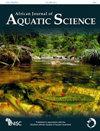埃塞俄比亚哈瓦萨湖浮游动物空间分布与若干理化水质参数的关系
IF 1
4区 环境科学与生态学
Q3 MARINE & FRESHWATER BIOLOGY
引用次数: 3
摘要
虽然淡水浮游动物空间变化的科学信息与湖沼学研究有关,但埃塞俄比亚裂谷湖哈瓦萨湖的信息很少。本研究旨在了解埃塞俄比亚哈瓦萨湖浮游动物优势类群的空间分布。2019年4月至8月,在四个地点连续五个月进行了样本采集和物理化学参数的现场测量。鉴定出22种浮游动物。其中,轮虫在物种丰富度和丰度方面都是最重要的。就物种丰富度和丰度而言,桡足类是第二重要的类群,而枝角类是最不丰富的类群。Tikur Wuha河入口处所有浮游动物群都非常罕见,这可能主要是由于应力,与极端浊度有关。轮虫在转诊医院感染者的入口处占主导地位,这表明它们适应了不太清澈的水和污染。桡足类在大型植物区的丰度最高,这表明它们喜欢高清晰度和庇护的水。我们得出的结论是,浮游动物密度与水质参数之间的空间变化对浮游动物作为一种具有成本效益的湖泊水质评估工具的适用性具有影响。本文章由计算机程序翻译,如有差异,请以英文原文为准。
Spatial distribution of zooplankton in relation to some selected physicochemical water quality parameters of Lake Hawassa, Ethiopia
While scientific information on spatial variation of freshwater zooplankton is relevant to limnological studies, little information is available from the Ethiopian Rift Valley lake: Lake Hawassa. This study aimed at understanding the spatial distribution of the dominant zooplankton taxa in Lake Hawassa, Ethiopia. Collection of samples and in situ measurements of physico-chemical parameters were carried out at four sites for five consecutive months from April to August in 2019. Twenty-two species of zooplankton were identified. Among these, rotifers were the most important with regard to both species richness and abundance. Copepods were the second most important group in terms of species richness and abundance, whereas cladocerans were the least abundant taxa. All zooplankton groups were very rare at the inlet of the Tikur Wuha River, which could be mainly due to stress, associated with extreme turbidity. Rotifers were predominant at the inlet of influents from referral hospital revealing their adaptation to less clear water and pollution. Copepods attained their highest abundance at the macrophyte zone indicating their preference for water with high clarity and refuge. We concluded that the spatial variation of the zooplankton density in relation to water quality parameters has implications for the applicability of zooplankton as a cost-effective water quality assessment tool in lakes.
求助全文
通过发布文献求助,成功后即可免费获取论文全文。
去求助
来源期刊

African Journal of Aquatic Science
MARINE & FRESHWATER BIOLOGY-
CiteScore
3.90
自引率
7.10%
发文量
31
审稿时长
>12 weeks
期刊介绍:
The African Journal of Aquatic Science is an international journal devoted to the study of the aquatic sciences, covering all African inland and estuarine waters. The Journal publishes peer-reviewed original scientific papers and short articles in all the aquatic science fields including limnology, hydrobiology, ecology, conservation, biomonitoring, management, water quality, ecotoxicology, biological interactions, physical properties and human impacts on African aquatic systems.
 求助内容:
求助内容: 应助结果提醒方式:
应助结果提醒方式:


